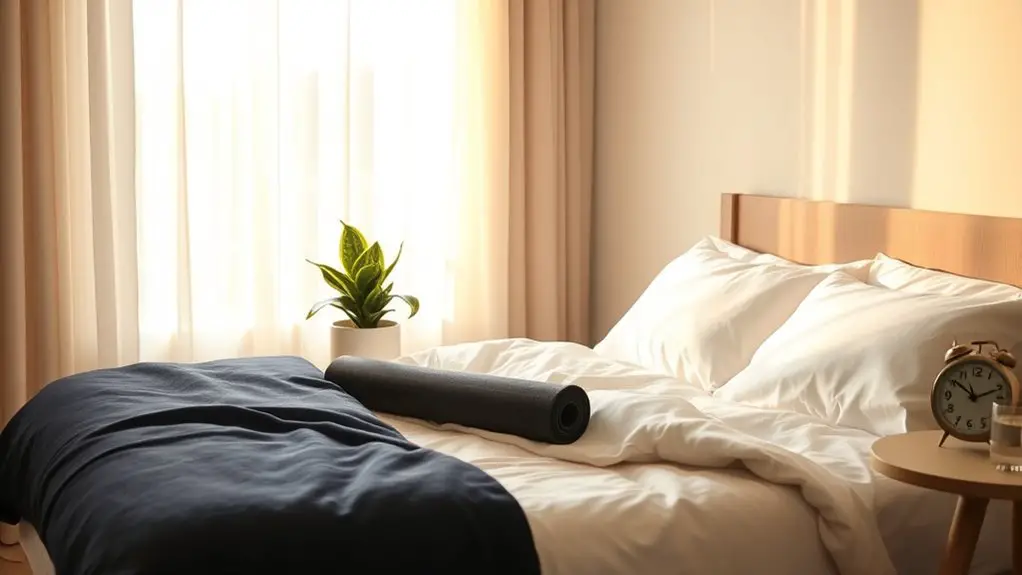How to Sleep Better for Muscle Recovery

To sleep better for muscle recovery, aim for 7 to 9 hours of quality rest each night. Establish a consistent sleep schedule by going to bed and waking up at the same time daily. Create a sleep-friendly environment by controlling light, noise, and temperature. Limit screen time before bed and incorporate relaxation techniques, like deep breathing or gentle stretching. Pay attention to your nutrition and hydration, focusing on balanced meals. There’s more to uncover about optimizing your sleep for recovery.
Understanding the Role of Sleep in Muscle Recovery

Sleep is essential for muscle recovery, acting as the body’s natural repair mechanism. During sleep, you cycle through various sleep stages, each playing a significant role in muscle repair. In deep sleep, your body releases growth hormones, which help to regenerate and repair tissues. This process is critical after a workout, as your muscles need time to heal and strengthen.
If you skimp on sleep, you might find it harder to recover, leading to increased soreness and a higher risk of injury. Prioritizing your sleep can enhance your overall performance and well-being. Aim for 7 to 9 hours of quality sleep to guarantee your body can effectively undergo the necessary repair processes. Remember, adequate rest isn’t just a luxury; it’s a cornerstone of healthy muscle recovery. By understanding the importance of sleep stages, you can better support your body’s needs and optimize your recovery efforts.
Establishing a Consistent Sleep Schedule
To really enhance your muscle recovery, you need a consistent sleep schedule. This means setting a fixed bedtime, limiting anything that disrupts your sleep, and using sleep aids wisely when necessary. By sticking to these practices, you’ll create an environment that’s more conducive to rest and recovery.
Set Fixed Bedtime
Establishing a consistent sleep schedule is essential for ideal muscle recovery, especially when you’re pushing your body to its limits. Setting a fixed bedtime helps regulate your internal clock, improving your sleep hygiene. A strong bedtime routine can make all the difference in how rejuvenated you feel.
| Time | Activity |
|---|---|
| 9:00 PM | Start winding down |
| 9:30 PM | Engage in relaxing activities |
| 10:00 PM | Lights out, sleep well |
Limit Sleep Disruptions
Maintaining a consistent sleep schedule goes hand in hand with minimizing sleep disruptions. To improve your sleep hygiene, try to go to bed and wake up at the same time every day, even on weekends. This helps regulate your body’s internal clock, making it easier to fall asleep and wake up naturally. Incorporating calming bedtime rituals, like reading or practicing relaxation techniques, can signal your body that it’s time to wind down. Avoid screens and stimulating activities before bed, as they can interfere with your ability to fall asleep. Creating a comfortable sleep environment, free from noise and light, will further enhance your sleep quality, allowing your muscles to recover effectively. Prioritize your rest—it’s essential for your overall well-being.
Use Sleep Aids Wisely
How can you effectively incorporate sleep aids into your routine without becoming reliant on them? Start by exploring options that promote healthy sleep patterns while prioritizing safety. Consider integrating the following into your regimen:
- Natural supplements like melatonin or magnesium to help regulate sleep cycles.
- Herbal remedies such as chamomile or valerian root, which can provide a calming effect.
- Sleep medications should be used sparingly and under professional guidance to avoid dependency.
- Cognitive behavioral therapy can be a great alternative, helping to address any underlying sleep issues.
Creating a Sleep-Inducing Environment
To get the most out of your sleep for muscle recovery, it’s essential to create a sleep-inducing environment. Start by optimizing your bedroom darkness, controlling the room temperature, and minimizing noise distractions. These simple adjustments can make a big difference in how well you rest and recover.
Optimize Bedroom Darkness
While many factors can influence your sleep quality, optimizing bedroom darkness is essential for creating a sleep-inducing environment. You want to guarantee your space is as dark as possible to promote better rest and muscle recovery. Here are a few tips:
- Invest in light blocking blackout curtains to shield against outside light.
- Use sleep masks if you can’t completely darken your room.
- Cover any electronic devices that emit light, such as alarm clocks or phones.
- Consider using a dim, warm-colored nightlight if you need to navigate the space safely.
Control Room Temperature
A comfortable room temperature plays an essential role in achieving restful sleep and aiding muscle recovery. To optimize your sleep environment, you’ll want to focus on temperature control. The ideal settings typically range between 60°F to 67°F (15°C to 19°C). Here’s a quick guide to help you find your perfect sleeping temperature:
| Temperature (°F) | Effect on Sleep |
|---|---|
| Below 60 | Too cold; may disrupt sleep |
| 60-67 | Ideal for quality rest |
| 68-72 | Comfortable, but may cause restlessness |
| Above 72 | Too warm; can lead to discomfort |
| Varies by person | Personal preference matters |
Experiment within these ranges to discover what feels best for you. Maintaining a cool environment can considerably enhance your overall sleep quality.
Minimize Noise Distractions
Creating a peaceful sleep environment is essential for minimizing noise distractions that can disrupt your rest and hinder muscle recovery. You might want to contemplate some effective soundproofing techniques to create a tranquil space. Here are a few tips to help you out:
- Use heavy curtains or soundproof blinds to block outside noise.
- Invest in a white noise machine to drown out disruptive sounds.
- Seal gaps around windows and doors to prevent noise leakage.
- Consider earplugs if you’re in a particularly noisy area.
Limiting Screen Time Before Bed
Since exposure to screens can interfere with your sleep quality, limiting screen time before bed is essential for muscle recovery. The blue light emitted by devices like phones and tablets can disrupt your circadian rhythm, making it harder to fall asleep. To promote better rest, consider implementing a digital detox in the hour prior to bedtime. This simple change allows your mind to unwind and prepares your body for sleep.
Instead of scrolling through social media or binge-watching shows, try reading a book or practicing gentle stretches. These alternatives can help reduce stimulation and ease you into relaxation. If you must use your devices, consider blue light filters or apps that reduce blue light exposure. By creating a screen-free environment before sleep, you’ll improve your overall sleep quality, leading to more effective muscle recovery. Prioritizing this habit can make a significant difference in how well you rest and recover.
Incorporating Relaxation Techniques

To enhance your sleep quality and support muscle recovery, incorporating relaxation techniques can be incredibly beneficial. These practices not only calm your mind but also prepare your body for restorative sleep. Here are some effective methods you can try:
Incorporating relaxation techniques can significantly enhance sleep quality and support muscle recovery, preparing your body for restorative rest.
- Mindfulness meditation: Spend a few minutes focusing on your breath, allowing thoughts to pass without judgment. This can reduce anxiety and promote relaxation.
- Deep breathing: Engage in deep, slow breaths to lower your heart rate and diminish stress. Inhale deeply through your nose, hold for a moment, then exhale through your mouth.
- Gentle stretching: Incorporate some light stretching before bed to relieve muscle tension and improve flexibility.
- Soothing music: Listen to calming sounds or soft music to create a peaceful atmosphere that encourages relaxation.
Nutrition and Hydration for Better Sleep
Proper nutrition and hydration play an essential role in improving sleep quality, especially when it comes to muscle recovery. To enhance your sleep, focus on nutrient timing—eating the right foods at the right times. Consuming a balanced meal rich in protein and complex carbs a few hours before bed can help stabilize your blood sugar levels.
Implement hydration strategies throughout the day, but limit fluid intake right before bedtime to prevent disruptions. Here’s a quick overview of key nutrients for better sleep:
| Nutrient | Timing |
|---|---|
| Protein | 1-2 hours before bed |
| Complex Carbs | 1-2 hours before bed |
| Magnesium | 30 minutes before bed |
| Hydration | Throughout the day |
Monitoring Sleep Quality and Making Adjustments

Monitoring your sleep quality is essential for maximizing muscle recovery. By utilizing sleep tracking tools, you can gain insights into your sleep patterns and make necessary adjustments. Regular quality assessment helps identify what’s working and what isn’t, guaranteeing you’re on the right track.
Here are some tips to enhance your sleep quality:
- Set a Consistent Sleep Schedule: Go to bed and wake up at the same time daily.
- Create a Relaxing Bedtime Routine: Wind down with calming activities like reading or gentle stretching.
- Limit Screen Time Before Bed: Reduce exposure to blue light to promote melatonin production.
- Evaluate Your Sleep Environment: Confirm your bedroom is dark, cool, and quiet for ideal rest.
Frequently Asked Questions
How Many Hours of Sleep Do Athletes Need for Optimal Recovery?
When you’re thinking about sleep duration, athletes typically need around 7 to 9 hours for ideal recovery. This amount of sleep helps improve recovery efficiency, allowing your body to repair and strengthen itself after intense workouts. It’s essential to prioritize quality sleep, as it enhances performance and reduces the risk of injury. So, make sure you’re getting enough rest to support your training and overall health.
Can Naps During the Day Improve Muscle Recovery?
Imagine a phone that’s almost out of battery; a quick charge can keep it running. Similarly, short naps can recharge your body, enhancing recovery benefits. Research shows that a 20-30 minute nap can boost alertness and performance without making you groggy. Just like that phone, your muscles need that energy boost too. So, if you’re feeling worn out, consider a nap; it might just be the recharge you need!
Does Sleep Position Affect Muscle Recovery Quality?
Yes, sleep position can definitely affect muscle recovery quality. If you’re not mindful of your sleep posture, it might lead to poor body alignment, which can strain your muscles. To promote recovery, try sleeping on your back or side, ensuring your spine stays aligned. Using a supportive pillow can help maintain this alignment, reducing the risk of discomfort. Prioritizing proper sleep posture can make a significant difference in how well your muscles recover.
Are There Specific Sleep Supplements That Aid Muscle Recovery?
Imagine your body as a car in need of fuel after a long drive. Just like premium gas can enhance performance, certain sleep supplements can optimize your recovery. Magnesium benefits muscle relaxation, easing tension and cramps, while melatonin effects help regulate your sleep cycle, guaranteeing deeper rest. When considering these supplements, it’s crucial to consult a healthcare professional to confirm safety and effectiveness, allowing you to recharge and hit the road again with confidence.
How Does Caffeine Impact Sleep and Muscle Recovery?
Caffeine can greatly impact your sleep quality and recovery. It affects caffeine metabolism, staying in your system for hours, which may delay sleep onset and reduce deep sleep stages. If you’re consuming caffeine, especially later in the day, you might find it harder to get the restorative sleep you need. Prioritizing good sleep hygiene can help mitigate these effects, ultimately supporting your muscle recovery and overall well-being.





